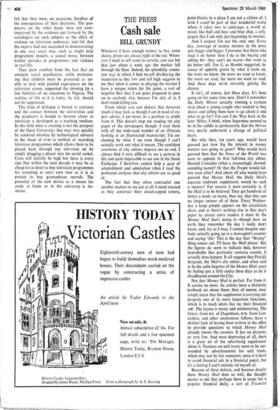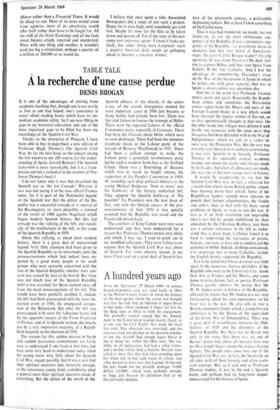Cash sale
THE PRESS BILL GRUNDY
Whenever I have enough money to buy some shares, prices are always right at the top. When- ever I need to sell some to survive, you can bet that just about a week ago the market fell through the floor. Indeed, the splendidly consis- tent way in which I find myself disobeying the injunction to buy low and sell high suggests to me that when it comes to playing the market I have a unique talent for the game, a sort of negative flair that I am quite prepared to pass on to anybody else, because I'm sick of it, I don't mind telling you.
From which you can deduce that however much it may look as though I am in need of ex- pert advice, I am never in a position to profit from it. This doesn't stop me reading the city pages of the newspapers though. I read them with all the wide-eyed wonder of an illiterate looking at an illuminated manuscript; I'm en- chanted by what I see even though I can't actually work out what it means. The confident assertions of city editors impress me no end. I always find it very difficult to see a pattern in life and quite impossible to see one in the Stock Exchange. I therefore cannot help a gasp of astonishment and admiration when I read the profound analyses that city editors are so good at.
The fact that they often contradict one another matters to me not at all. I stand amazed as they construct their cloud-capped towers, point-blocks in a place I am not a citizen of. I wish I could be part of that wonderful world where it takes two to contango, a world of words like bull and bear and blue chip, a jolly jargon that I am only just beginning to smatter.
And I suspect I'm not the only one. Every day, coverage of money matters in the press gets bigger and bigger. I presume that those who read it do better than I do at the buying and selling bit—they can't do worse—but want to do better still. For if, as Hamlet suggested, in- crease of appetite grows by what it feeds on, the more we know, the more we want to know; the more we read, the more we want to read. And these days we're certainly getting the chance.
It isn't, of course, just these days. It's been going on for some time now. Don't I remember the Daily Mirror actually running a cartoon strip about a young couple who wanted to buy shares and telling them how to go about it and what to go for? I'm sure I do. Way back in the later 'fifties, I think, when Supermac seemed to be in the saddle so permanently that the Mirror very nearly underwent a change of political heart.
But who then, ten years ago, would have guessed just how big the interest in money matters was going to grow? Who would have guessed then that the News of the World was soon to appoint its first full-time city editor, Hamish Conochie (what a reassuringly shrewd- sounding name)? Or that the People would fol- low soon after? And above all who would have guessed that Money Mail, the Daily Mail's separate midweek supplement, would be such a success? For success it most certainly is, if the Mail is to be believed. They get hundreds of letters a week; so many, they say, that they can no longer answer all of them. Every Wednes- day a large pimple appears on the circulation chart, and as there's nothing else in that day's paper to attract extra readers it must be the Money Mail that's doing it—though how on earth they remember the day I really don't know, and, try as I may, I cannot imagine any- body actually going up to a newsagent's counter and saying `Ah 1 This is the day that "Money" thing comes out. I'll have the Mall please.' But the figures do seem to indicate that, however improbable that particular scenario sounds, it actually does happen. It all suggests that Patrick Sergeant, the Mail's city editor, and often said to be the onlie begetter of the Money Mail, must be feeling just a little cocky these days as he is chauffeured around the City.
Not that Money Mail is perfect. Far from it. It carries no news. Its articles have a distinctly textbook air about them; that, of course, may simply mean that the supplement is carrying out properly one of its more important functions, which is to teach idiots like me their financial Ant The layout is messy and uninteresting. The letters, from B.C. of Dagenham, H.W. from Lan- cashire, and other anonymous fellows, have a distinct look of having been written in the office to provide questions to which Money Mail already knows the answers. It has no pictures, or very few. And most depressing of all, there is a great air of the advertising supplement about it. Features on unit trusts seem to be sur- rounded by advertisements for unit trusts, which may not be fair comment, since it is hard to avoid financial ads in a financial paper, but it's a feeling I can't entirely rid myself of.
Because of these defects, and because despite them Money Mail does so well, the thought occurs to me that perhaps there is scope for a popular financial daily, a sort of Financial Mirror rather than a Financial Times. It would be cheap to run. Most of its news would come from agencies, most of its advertising would offer itself rather than have to be fought for. AU the stuff of the Stock Exchange and all the facts about finance crisply reported and interpreted. What with one thing and another, it wouldn't need too big a circulation; perhaps a quarter of a million or 300,000 or so would do. I believe that once upon a time Associated Newspapers did a study of just such a project. Hopes for it were high, until somebody got cold feet. Maybe it's time for the files to be taken down and dusted off. For if the state of the eco- nomy ever improves again—I know it looks un- likely, but odder things have happened—such a popular financial daily might go galloping ahead to become a runaway winner.



































 Previous page
Previous page